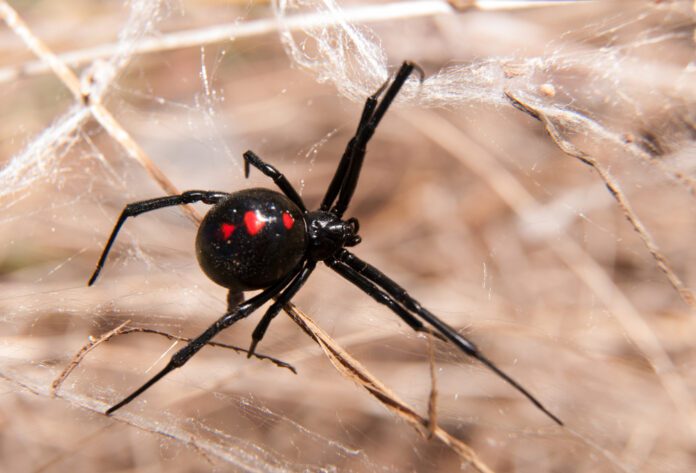Overview Of Black Widow Spider
The black widow spider (Latrodectus genus) has a shiny black body with a red hourglass shape on its belly area. The venomous bite of a black widow spider is toxic. The genus of spiders, to which the black widow belongs, contains the largest number of venomous species known.
Poisonous Ingredient
The venom of the black widow spider contains toxic chemicals that make people sick.
Where Black Widow Spiders Are Found
Black widows are found throughout the United States, mostly in the South and West. They are usually found in barns, sheds, stone walls, fences, woodpiles, porch furniture, and other outdoor structures.
This genus of spider species is found worldwide. They are most plentiful in temperate and subtropical climates, especially during the summer months.
Symptoms Of Black Widow Spider Bites
The first symptom of a black widow spider bite is usually pain similar to a pinprick. This is felt when the bite is made. Some people may not feel it. Minor swelling, redness, and a target-shaped sore may appear.
After 15 minutes to 1 hour, a dull muscle pain spreads from the bite area to the whole body.
- If the bite is on the upper body, you will usually feel most of the pain in your chest.
- If the black widow spider bite is on your lower body, you will usually feel most of the pain in your abdomen.
The following symptoms can also occur:
- Anxiety
- Difficulty breathing
- Headache
- High blood pressure
- Increased saliva
- Increased sweating
- Light sensitivity
- Muscle weakness
- Nausea and vomiting
- Numbness and tingling around the bite site, then sometimes spreading out from the black widow spider bite
- Restlessness
- Seizures (usually seen just before death in children who are bitten)
- Very painful muscle cramps or spasms
- Facial swelling in the hours after the black widow spider bite. (This pattern of swelling is sometimes confused with an allergy to the drug used in treatment.)
Pregnant women may have contractions and go into labor.
Home Care
Black widow spider bites bites are very toxic. Seek medical help right away. Call the Poison Control Center for guidance.
Follow these steps until medical help is given:
- Clean the area with soap and water.
- Wrap ice in a clean cloth and place it on the black widow spider bite area. Leave it on for 10 minutes and then off for 10 minutes. Repeat this process. If the person has blood flow problems, decrease the time that the ice is on the area to prevent possible skin damage.
- Keep the affected area still, if possible, to prevent the venom from spreading. A homemade splint may be helpful if the bite was on the arms, legs, hands, or feet.
- Loosen clothing and remove rings and other tight jewelry.
Before Calling Emergency
Have this information ready:
- Person’s age, weight, and condition
- Time the bite occurred
- The area on the body where the black widow spider bite occurred
- Type of spider, if possible
Poison Control
Your local poison center can be reached directly by calling the national toll-free Poison Help hotline (1-800-222-1222) from anywhere in the United States. They will give you further instructions.
This is a free and confidential service. All local poison control centers in the United States use this national number. You should call if you have any questions about poisoning or poison prevention. It does NOT need to be an emergency. You can call for any reason, 24 hours a day, 7 days a week.
What to Expect at the Emergency Room
If possible, bring the black widow spider to the emergency room. Put it in a secure container.
The health care provider will measure and monitor the person’s vital signs, including temperature, pulse, breathing rate, and blood pressure.
The person may receive:
- Antivenin, a medicine to reverse the effects of the venom, if available
- Blood and urine tests
- Breathing support, including oxygen, the tube through the mouth into the throat, and breathing machine (ventilator)
- Chest x-rays, abdominal x-rays, or both
- ECG (electrocardiogram, or heart tracing)
- Intravenous fluids (IV, or through a vein)
- Medicines to treat symptoms
In general, children, pregnant women, and older people may need to be given Latrodectus antivenom to reverse the effect of the venom after a black widow spider bite. However, it can cause serious allergic reactions and must be used carefully.



